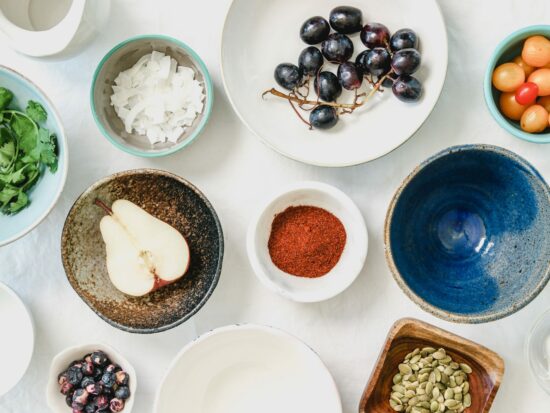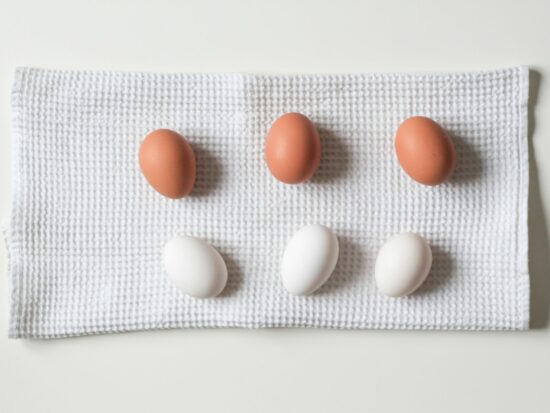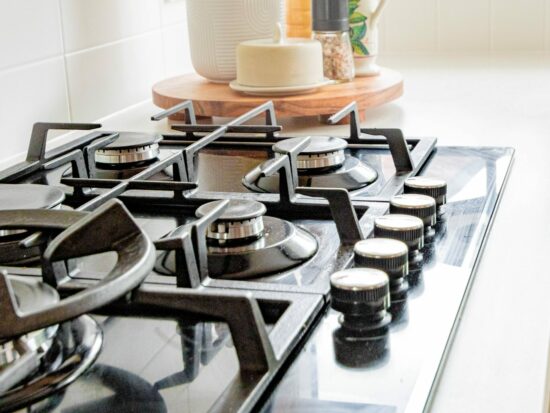15 Ways to Reduce Waste in the Kitchen
Part 2 in our series: Reducing Waste Around the House

Along with our bathrooms, our kitchen can be big a source of household waste. But that also means that, by making thoughtful changes, we can make a big difference in the amount and type of waste we generate! In the kitchen, this may look like simple swaps, reducing usage of something, or purchasing alternatives. Keep reading to learn fifteen ways you can reduce waste in the kitchen!
Food Waste
- Plan before you shop – Having a plan before you stroll the grocery store isles can help to minimize impulse purchases that result in wasted food. Meal planning can also help you think through what to do with leftovers and ensure that you will use what you do purchase.
- Pro tip: If you are in need of some new dinner ideas, check out this free resource on our RESOURCES page – Menu Calendar: Twenty-Five Dinner Ideas.
- Preserve your food before it goes bad – If you suspect your ingredients or meals will go bad before you have a chance to enjoy them, consider how you might best preserve them. At our house, this often means freezing leftovers, but it can also mean canning, dehydrating, freeze drying, and more. (Note: We plan to share some of our favorite preservation resources on our RESOURCES page some time this upcoming year. Keep your eyes peeled for once it posts!)
- Repurpose those scraps – Instead of throwing your food scraps in the trash, see if you can reuse them in another dish! Kathryn Kellogg from Going Zero Waste has a series of reels on her Instagram page with the title “Scraptastic Recipe.” (As of publishing this post, she has over 50 parts to the series!)
- Compost what you cannot save – Alternatively, get chickens or pigs! Ha! Composting is not complicated. And in this day and age, there are so many different ways you can make composting work for you, whether it is through an on-counter system, a backyard bin, or perhaps even a compost pickup organized in your community. Local people, check out these Louisville-based composting resources: Louisville Compost Co-Op, Composting at Home from LouisvilleKY.gov, and U of L Sustainability’s Composting page.

Packaging
- Buy food in bulk or package free – When we started learning more about the sheer volume of waste generated by conventional grocery shopping, we began to look for ways we could reduce our contributions. One such way was by shopping at our local grocery store’s bulk goods section. As we learned more, we discovered Azure Standard (an online, whole foods grocery co-op). Azure Standard has been a better fit for this stage of life because 1) they have a much larger selection of goods, and 2) we can more accurately tailor the quantity needed. As a bonus, they package most of their shelf-stable items in glass or paper bags.
- A note on Azure – If you choose to make a purchase from Azure, we would greatly appreciate if you used our link. We get a credit on any $100+ orders that we can then put towards supporting our family’s grocery needs!
- A note on package free – When you have the option, look for fruits and veggies sold without extra wrapping. For example: loose potatoes, onions, apples, etc. Over time, the extra layers of plastic and non-recyclable materials really add up.
- Buy hand soap, dish soap, and dishwasher detergent in bulk or package free – Bar soap for hands or dishes (yes, you read that right…bar soap for dishes, like this one), bulk liquid soap in recyclable containers, dishwasher detergent with refill packs…there are so many great options these days! Check out our kitchen recommendations page to see the brands we are currently using for these items.
- Bring along your reusable shopping bags – This was one of the easiest transitions we made back when we started our journey into eco-friendly living. To keep track of the bags, we keep them in the back of the car and have made it a habit to grab them before heading into stores (grocery or elsewhere). As a backup, Erica keeps a small foldable bag in her purse. Once we get home and unload, we set the reusable bags next to Erica’s purse to remind us to place them back in the car the next time we head out. In addition to being waste free, reusable cotton bags are much more durable compared to plastic, and they can be washed! Minimal effort and investment, but great impact over time!
- Bring along your reusable containers – In addition to bringing reusable containers to the grocery store for purchasing bulk goods and corralling loose produce, you can bring your own containers when you go out to eat. This one may take a bit more practice before it becomes a habit, since it is probably not something you will choose to carry around every time you are out and about. (Full disclosure: we are still working on this one!) In our personal experience, those single-use containers fill up the trash/recycling quickly. It is best to avoid bringing them home in the first place!
- Reuse your jars – Although plastic does have its place in our society, we endeavor to avoid using plastic in the kitchen, especially when it comes to storing food. But materials like glass and stainless steel can get expensive to buy new all at once. Instead, try saving some of those old pasta jars or other glass containers. You might be surprised to realize how much can fit inside, whether you reuse them for bringing a salad to work, storing leftover soup in the fridge, or mixing up homemade marinades!

Fabrics and Cleaning in the Kitchen
- Look for 100% cotton hand and dish towels – Many towels on the market are made by blending synthetic fibers and cotton. These are best to avoid, as they shed microfibers (the most prevalent form of microplastic). Instead of cotton-blend hand and dish towels look for 100% cotton, untreated (no stain-repellent or the like) towels. Bonus points if you can purchase un-dyed or naturally dyed, organic cotton. Conventional cotton’s heavy insecticide and pesticide use has given it the title of dirtiest crop on earth, and the ingredients in many textile dyes have harmful effects on health and the environment.
- A note on stains – If your towels do happen to get stained, try running a load with a non-toxic oxygen booster like this one (and yes, its color safe!).
- Stop buying paper towels (or reduce your dependency on them) – Swap out your paper towels with a set or two of sturdy cotton wash cloths or towels. While you are making the swap, we recommend keeping the cloths in the same spot you would go to grab a paper towel. It can also help to have a plan in place ahead of time for laundering the cloths. We have kept a trash can just for soiled cloths in our kitchen before, which was helpful for corralling cloths when our laundry room was on a different floor. Another tip for making the switch? Let yourself fully run out of paper towels before purchasing more, as you will then “force” yourself to start the habit of using cloths instead. We think once you go cloth, you will wonder how you ever did things before with those flimsy, thin disposables!
- A note on cleaning up gross stuff – Keep a stash of old t-shirts and worn fabrics from which to pull when you are faced with cleaning up a particularly gross mess (think: bodily fluids, cleaning up after your dog or cat, etc.). You can toss them once used and feel guilt free since no extra waste will be generated!
- Switch out your synthetic sponge – Many sponges on the market today are made from petroleum by-products and plastics. Gross! Not to mention, they harbor bacteria that cause a nasty stink to develop over time. Non-toxic and zero waste replacements include: natural scrub brushes (like this one), walnut scrubbers (like these), and sturdy cotton cloths (like these). We use the scrub brushes linked and have never had an issue with smell or the bristles coming out. If we encounter caked, baked, or cooked on food particles that aren’t getting removed from a routine washing, we simply soak the soiled item overnight in water and Branch Basics (and sometimes add in a sprinkle of their Oxygen Boost). That does the trick every time!

Energy Consumption
- Heat up only the amount of water you need – Whether in your tea kettle or in a pot, try to only add as much water as you need. For example, if you are heating water to make tea, try to measure out close to the same amount you will put in your cup rather than filling the kettle. This key not only saves water from being wasted, but it also saves energy, as you will reduce the amount of time required to boil or heat up the water.
- Use the correct size burner for your pot or pan – Similar to the previous tip, choosing the correct burner means efficiency in time and energy, as well as improved heat transfer.
- For further learning – Check out this article on tips for cooking with an electric stove or this article’s section on gas stove cooking tips.
- Soak your beans and grains before cooking – By allowing beans and grains to soften and absorb some water on the front end, you can cut their cooking time in as much as half! In addition, soaking reduces gas or electric use and oftentimes increases the health benefits of the beans or grains. Did you know that you can even soak things like noodles and lentils? Just remember the tip from before to only use as much water as you need.
- For further learning – If you are new to soaking, you might find value in reading this article on soaking and sprouting beans and this article on soaking grains.
There you have it! 15 ways to reduce waste in the kitchen. Did we miss anything? Comment below to share your ideas with our community!
If you liked this article, you might enjoy perusing our other kitchen recommendations located under our Recommendations page. Or, check out the other posts in this series on our Waste Reduction page.
Yours truly,
Erica Barlow


 15 Ways to Reduce Waste in the Bathroom
15 Ways to Reduce Waste in the Bathroom